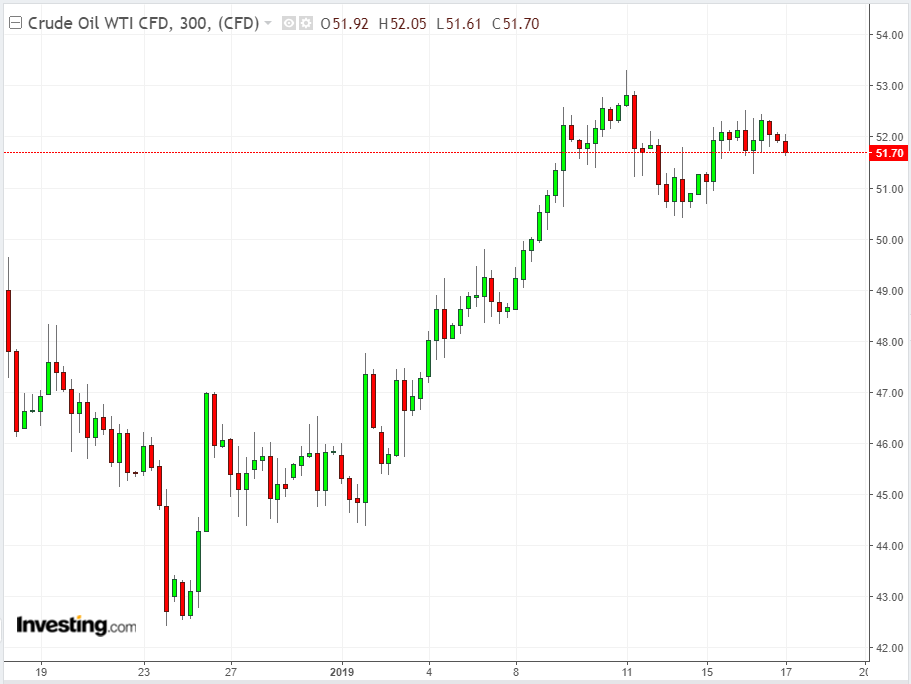While most oil traders focus on the big three producers of our day—Saudi Arabia, Russia and U.S. shale—we shouldn't ignore struggling producers. Missing supply from Mexico, Iran and Venezuela will also affect the market and prices, after all.

Here are some updates:
1. Mexico
Mexico’s gasoline crisis caused a huge build in gasoline stocks in the United States this week. Mexico cannot produce enough gasoline to meet demand. To compensate, it has been importing gasoline from the U.S. In fact, Mexico is the largest importer of U.S. gasoline.
The problem right now is that Mexico has shut down several key pipelines in order to stop rampant theft. According to the Mexican government, $3 billion worth of petroleum products were siphoned off from pipelines and stolen from refineries last year. These pipelines also carry petroleum products imported from the U.S. and the shutdown has led to a backlog of ships stuck at Mexican ports unable to unload their gasoline cargoes. We are now seeing the impact of this in the weekly EIA data released on Wednesday, which showed a major gasoline build.
If the backlog in Mexico continues, it could impact refinery runs in the U.S. and spill over into U.S. crude oil stocks. (For an in-depth look at the origins of the gasoline and theft issue in Mexico, take a look at this piece from RBN Energy).
2. Iran
U.S. sanctions are having a significant impact on Iran’s crude exports. According to the U.S. special representative to Iran, the sanctions have brought Iran’s oil exports down to less than 1 million barrels per day. According to TankerTrackers.com, Iran’s actual exports are slightly higher. In December, Iran averaged 1.1 million barrels per day. TankerTrackers.com calculates Iran’s crude oil production at about 2.738 million barrels per day in December. That's a 3.6% drop from November, when sanctions were first instituted. It does appear at this point that the Trump administration would have to apply more pressure if the U.S. wants to bring Iran’s exports below the 1 million barrel per day mark, so there is a good possibility that there will no be significant further dislocations at least through April.
3. Venezuela
Given how effective U.S. sanctions on Iran’s oil industry have been, traders should pay close attention to Venezuela. According to new reports, the Trump administration is considering sanctions on that country's oil industry. S&P GlobalI Platts reported that Venezuela produced 1.17 million barrels per day in December. Venezuela currently sells a little less than half of this to the U.S., so sanctions would badly hit U.S.-based refiners (including those owned by Venezuela) that purchase Venezuelan crude. Sanctions on Venezuela’s oil industry could also affect the distribution of crude blends on the market, as Venezuela produces mostly heavy crude.
Venezuela is also heavily in debt to Russia and China. A significant amount of the cash it makes from selling crude oil goes to pay interest on loans from these countries. If the U.S. cuts off this source of cash for Venezuela, Russian and Chinese interests might move to seize Venezuelan oil assets outside of the country as collateral. For the U.S. this could have significant implications, as much of Citgo has been used as collateral for debts to Rosneft (OTC:OJSCY).
Citgo is the U.S. refining arm of Venezuela’s national oil company, PdVSA, and has refineries in Corpus Christi, Texas and elsewhere in the United States. In this event, the U.S. government could try to block Rosneft, Russia's national oil champion, from acquiring Citgo on national security grounds through the Committee on Foreign Investments in the United States (CFIUS).
The issue has been on lawmakers’ radar for nearly a year. Last February a group of investors, led by the Swiss energy and commodities trading firm Mercuria, applied for a license from the U.S. Treasury’s Office of Foreign Assets Control (OFAC) to buy Rosneft’s debt in PdVSA. There is no indication if any resolution has been made or how the CFIUS or OFAC would respond to a change in Citgo ownership.
